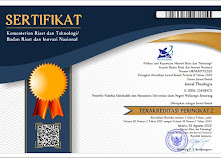KRITIK ATAS CORAK PEMIKIRAN TEOLOGI ISLAM KH. SIRADJUDDIN ABAS
DOI:
https://doi.org/10.21580/teo.2016.27.2.1070Keywords:
Sunni, Mu’tazilah, Syafi’iyah, akal, wahyuAbstract
Abstract: The article aims to elaborate patterns of theological thought of KH Siradjuddin Abbas (1905-1980). In the midst of mainstream theological schools established in the Islamic world: traditionalists (Sunni) and rationalists (Mu'tazila), Abbas turns out consistently defend traditional theology. In theological thinking, Abbas positioned parallel to al-Ash'arite classical theology (Ahl al-Sunnah wa ’l-Jamā’ah). He stressed all a round of God, revelation paced and use the reason is very little. He put God as absolute ruler, do as His Will. Therefore, theology of Siradjuddin Abbas is very strong hold on revelation and theocentric pattern, and everything begins and centered on God, good or bad all determined by God. Thus theology Siradjuddin Abbas less in line with modern thinking, which is progressive and forward the reason. In other words, theology of Siradjuddin Abbas less actual and contextual for the purposes of contemporary social reality if that expected from such thinking is an applicative conceptual thinking.
Abstrak: Artikel ini bertujuan mengelaborasi corak pemikiran teologi K.H. Siradjuddin Abbas (1905-1980). Di tengah mainstream aliran teologi yang sudah mapan di dunia Islam: tradisionalis (Sunni) dan rasionalis (Mu’tazilah), Abbas ternyata konsisten membela teologi tradisional. Dalam pemikiran teologinya, Siradjuddin Abbas sejalan dengan pemikiran teologi klasik al-Asy’ariyah (Ahl al-Sunnah wa ’l-Jamā’ah). Ia menekankan segala suatu serba Tuhan, serba wahyu dan sangat sedikit menggunakan akal pikiran. Ia menempatkan Tuhan sebagai berkuasa mutlak semutlak-mutlaknya, berbuat sehendak-Nya. Karena itu, teologi Siradjuddin Abbas sangat kuat berpegang pada wahyu dan bercorak teosentris, dan segalanya bermula dan memusat pada Tuhan, baik atau buruk semua ditentukan oleh Tuhan. Dengan demikian teologi Siradjuddin Abbas yang bercorak tradisional ini kurang sejalan dengan pemikiran modern, yang bersifat progresif dan lebih mengedepankan akal. Dengan kata lain, teologi Siradjuddin Abbas yang bercorak tradisional kurang aktual dan kontekstual untuk keperluan realitas sosial kontemporer jika yang diharapkan dari pemikiran tersebut adalah sebuah pemikiran yang bersifat konseptual aplikatif.Downloads
References
Abbas, K.H. Siradjuddin, I’tiqad Ahlususunnah wal-Jamaah. Jakarta: Pustaka Tarbiah, 1994.
Abdullah, M. Amin, Falsafah Kalam di Era Kontemporer. Yogyakarta: Pustaka Pelajar, 1997.
Adam, D.S. “Theology”, dalam James Hastings (ed), Encylopedia of Religion and Ethis,Vol. 12, New York: Charles Scribner’s Sons, t.th.
al-Ash’arī, Abū Ḥasan, al-Lumā’ fī al-Radd ‘ala Ahl al-Zain wa al-Bidā’, Kairo: Syarīkah Musahamah Miṣriyah, 1955.
Dahlan, Abdul Aziz, Sejarah Perkembanagn Pemikiran dalam Islam, Jakarta: Beonebi Cipta, 1980.
Hanafi, A., Pengantar Teologi Islam, Jakarta: Pustaka Al-Husna, 1980.
Ibn Aḥmad, ‘Abd al-Jabbar, Syarḥ al-Uṣūl al-Khamsah, Kairo: Maktabah Wahbah, 1965.
Koto, Alaiddin, “Pemikiran dan Perilaku Politik K.H. Siradjuddin Abbas”, Laporan Penelitian, Pekan Baru: Balai Latihan dan Pengabdian Kepada Masyarakat, Institut Agama Islam Negeri Sulthan Syarif Qasim, 1994.
Kuntowijoyo, Paradigma Islam Interpretasi Untuk Aksi, Bandung: Mizan, 1991.
Martin, Richard C. dkk, Post-Mu’tazilah: Genealogi Konflik Rasionalisme dan Tradisionalisme Islam, terj. Muhammad Syukri. Yogyakarta: IRCiSoD, 2002.
Miswar, Khairil, “Komparasi Pemikiran Abu Hasan Al-Asy'ari dan Siradjuddin Abbas tentang Konsep Istiwa”, 2014. Dimuat pada laman http:// patahkekeringan.blogspot.com/
Muhtada, Dani, “Paradigma Hukum Persatuan Tarbiyatul Islamiyah: Analisis Pemikiran Hukum K.H. Siradjuddin Abbas”, 2014. Dimuat pada laman http://www.islamcendekia.com.
Nasution, Harun, Teologi Islam, Analisa Perbandingan, Jakarta: UI Press, 1972.
__________, Islam Ditinjau Dari Berbagai Aspeknya, Jakarta: UI Press, 1973.
__________, Akal dan Wahyu dalam Islam, Jakarta: UI Press, 1983.
__________, Muhammad Abduh dan Teologi Rasional Mu’tazilah, Jakarta: UI Press, 1987.
Rahman, Fazlur, Islam and Modernity: Transformation of Intellectual Tradition, Chicago: Unversity of Chicago Press, 1982.
al-Shahrastanī, Muḥammad ibn ‘Abd al-Karīm, al-Milāl wa al-Nihāl. Kairo: tp.,. 1951.
Thahir, Lukman S., Studi Islam Interdisipliner: Aplikasi Pendekatan Filsafat, Sosiologi dan Sejarah, Yogyakarta: Qirtas, 2004.
Verm, Vergilius (ed.), An Encylopedia of Relegion, New York: Green Press, 1976.
Yusuf, Yunan, Corak Pemikiran Kalam Tafsir Al-Azhar, Jakarta: Panjimas, 1990
Downloads
Published
Issue
Section
License
The copyright of the received article shall be assigned to the journal as the publisher. The intended copyright includes the right to publish the article in various forms (including reprints). The journal maintains the publishing rights to the published articles.
Note: Authors are allowed to use their articles for any legal purposes deemed necessary without written permission.
Licensing

This work is licensed under a Creative Commons Attribution-ShareAlike 4.0 International License.
_______
Copyright Transfer Aggreement
In order for Jurnal Theologia to publish and distribute research articles, the editors need publishing rights (transferred from author to publisher). This agreement relates to the transfer/publishing copyright license to Jurnal Theologia but the authors still have significant rights to use and share their published articles.
Jurnal Theologia supports the need for writers to share, disseminate and maximize the impact of their research and their rights on any database. As a journal article writer, you have the right to various uses of your articles, including that by the institution or company where you work. Copyright can be used without the need for special permission. Authors who publish articles in the Jurnal Theologia have broad rights to use their work for teaching and scientific purposes without requesting permission, including:
- Use by the author for lectures, presentations, or conferences, with distribution of copies to participants;
- Distribution to colleagues for research use;
- Use in compilations of the author's subsequent work;
- inclusion in a thesis or dissertation;
- Reuse of sections or excerpts from articles in other works (with full acknowledgment of the final article);
- Preparation of derivative works (other than commercial purposes) (with full acknowledgment of the final article);
- Voluntary posting on open websites operated by authors’ or writers' agencies for scientific purposes
When submitting a manuscript, authors do so on the understanding that if accepted for publication, the copyright for publishing (publishing right) of the article shall be assigned/transferred to Jurnal Theologia.
Authors whose articles are accepted for publication will receive confirmation via email and sent a Copyright Transfer Agreement.














